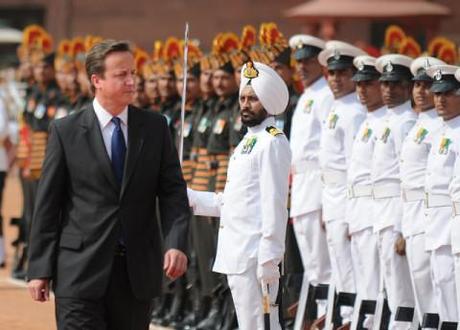
Prime Minister David Cameron is greeted by a Guard of Honour as he arrives at the Presidential Palace in Delhi during a visit to India. Photo credit: The Prime Minister's Office
British Prime Minister David Cameron has said Britain will continue to provide foreign aid to increasingly prosperous India. The renewment of Britain’s financial assistance to its former colony has angered some Tory MPs and perplexed some in the political commentariat, especially given that the Indian government has indicated if no longer requires assistance.
International aid is among few areas that have not been subjected to deep funding cuts by the Coalition government. Britain currently gives £280 million annually to India, six times more than supplied by any other country. The Sunday Telegraph reported that the Indian Finance Minister Pranab Mukherjee had told the country’s upper parliamentary house that “we do not require the aid [from Britain]. It is a peanut in our total development expenditure“.
“We have reviewed our aid commitments to India. We continue to think it is right to stick to those aid commitments. We continue to provide aid to India, but we focus it on the three poorest states,” Cameron’s spokesman said. “The reason we are doing that is because a huge number of the poorest people in the world live in these states. The Government has always been very clear about sticking to its aid commitments and the fact that it would not balance the books on the backs of the poorest people in the world. It is going to stick to that,” the spokesman said without identifying the three states.
India is the world’s second fastest growing economy. The country has more millionaires than Britain.
Cameron’s intensely political decision. Dominic Lawson of The Independent asked “if India doesn’t want it, why are we still giving them money?” Lawson insisted that Cameron’s “decision to maintain and even increase our overseas aid budget, while cutting every other department apart from Health, was intensely political. Heavily advertised in the years ahead of the 2010 general election, the commitment was designed to persuade voters that the Conservatives were not hard-faced grinders of the poor, but actually possessed of a highly developed social conscience. It was, in other words, designed to make people ‘feel good’ about voting Conservative, part of the strategy described as ‘decontamination of the Tory brand.’” “So, in other words,” sighed Lawson, “the government believes we should borrow yet more money we don’t have, to increase our development aid to a nation whose own economy is booming and whose government has asked us to stop sending them the cheques, because it has all become too embarrassing.” Lawson said that such foreign aid programmes can “remove from the recipient governments the urgency of dealing with their own people’s poverty; that in a sense we are infantilising such nations, just as we would be our own children if we continued to give them pocket-money when they had reached the age of 50,” and heavily criticized the Coalition’s motives – “a combination of misplaced post-colonial noblesse oblige and a desire to look good on the international stage.”
Gigantic vanity project. “No, my country doesn’t need British aid. It’s patronising, stifling and just enriches a corrupt elite,” wrote Indian journalist Rahul Bedi at The Daily Mail’s Right Minds comment hub. He said that “far from welcoming this largesse, the Indian nation is increasingly exasperated at being treated as a needy beneficiary” and described the programme as “unnecessary, patronising and counter-productive. It smacks of an outdated, colonialist mindset rather than modern economic reality.” Bedi insisted that India is the “very opposite” of a “desperate, poverty-stricken land struggling for survival” and reminded that the country is “among the world’s fastest growing economies, characterised by growing prosperity and an expanding civic infrastructure” and has its own nuclear weapons arsenal and space programme. “In truth,” insisted Bedi, the Coalition’s aid programme “is just a gigantic vanity project designed to make London’s politicians feel good about themselves, to permit them to strut on the international stage, posing as the saviours of the developing world.” Aid is “nothing but a hindrance to India. My country can find the solutions to its own problems without posturings from British politicians still trapped in the past,” concluded Bedi.
“The aid programme just reinforces the anachronistic image of India as helpless, impoverished and still reliant on its old imperial master,” lamented Rahul Bedi at The Daily Mail. “It is no wonder that many Indians find this offensive, given the phenomenal boom that the country is undergoing.”
Shared history creates problems. “The truth is that when the going gets tough, the rampaging bull elephant in the room is our ‘shared history’ of colonialism – Britain’s subjugation of India for more than 200 years, centuries of professed superiority, and countless cruelties from the Amritsar massacre to Churchill’s refusal to aid millions of starving Bengalis during the Second World War,” adjudged Dean Nelson at The Daily Telegraph, who said that “when conflicts arise, as they do in all trade and political relationships, the clash between the affinity our fonder memories of empire expect and the generational resentment taught to Indians in school is never far from the surface.” Fraser urged the Coalition to forget about aid and instead work at encouraging British businesses to work harder to build better trading performance in booming India.

